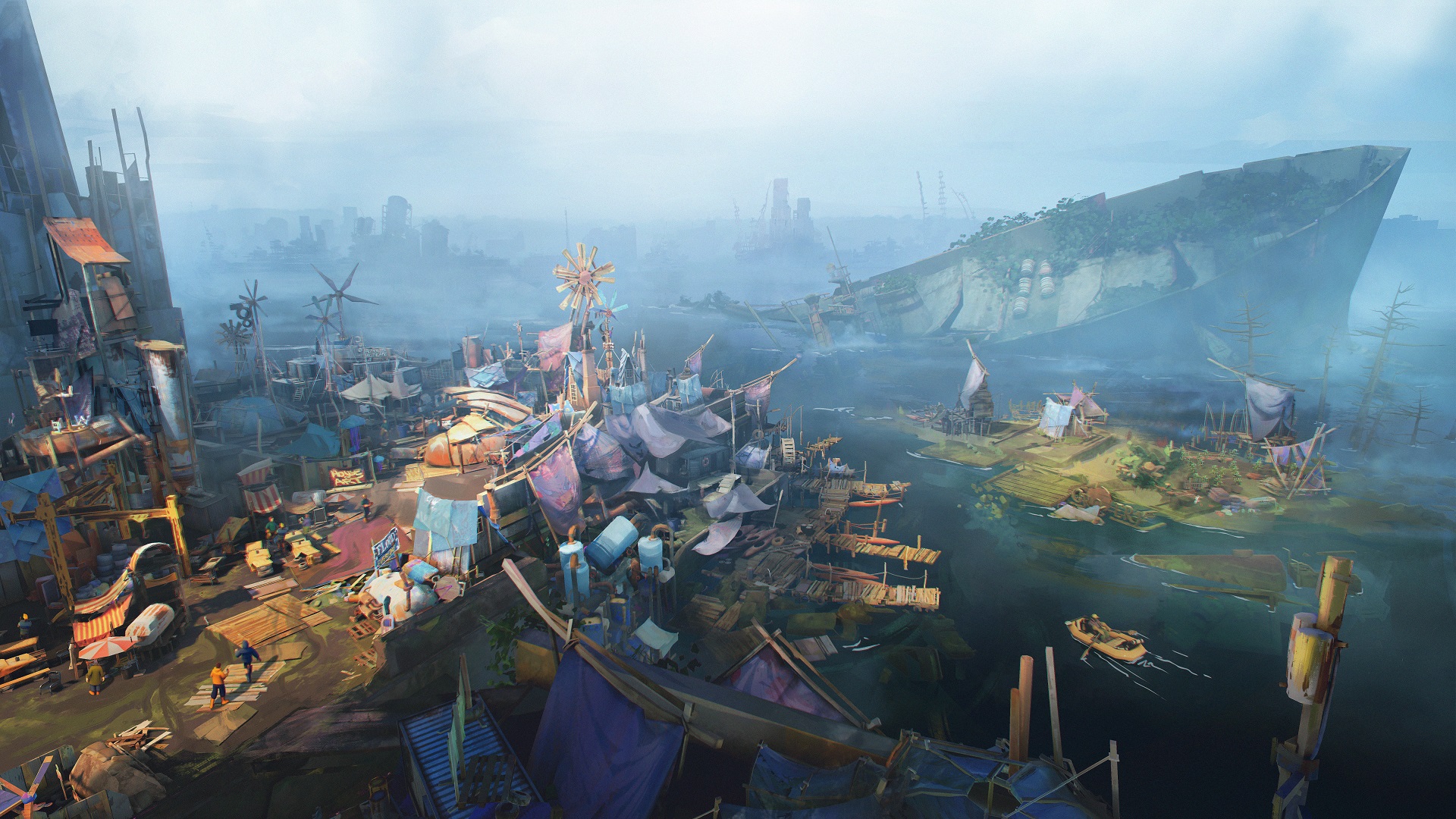GamesRadar+ Verdict
Floodland is a city builder that triumphs because it focuses on its citizens as much as the city. A strong narrative both in its story and in your interactions with the clans means constant decision-making that'll always make you think in a way that city builders rarely do.
Pros
- +
Lovely interplay between community and city building
- +
Interesting story and setting
- +
Side narratives are well-played
Cons
- -
Lots of bugs
- -
Frustrating reliance on a few key resources
Why you can trust GamesRadar+
The world might change but you can guarantee that not all humans will. In Floodland, where we attempt to exist in a world where the vast majority of land is underwater, there are still rifts appearing between my tribes over laws like same-sex marriage, or whether to impose compulsory masks to help alleviate the latest epidemic raging across the archipelago.. Eventually, I choose to banish the tribe that can't accept the rules of this new, freer world – but I also suffer the loss of the suddenly reduced workforce as a result. Everything in Floodland is a balance.
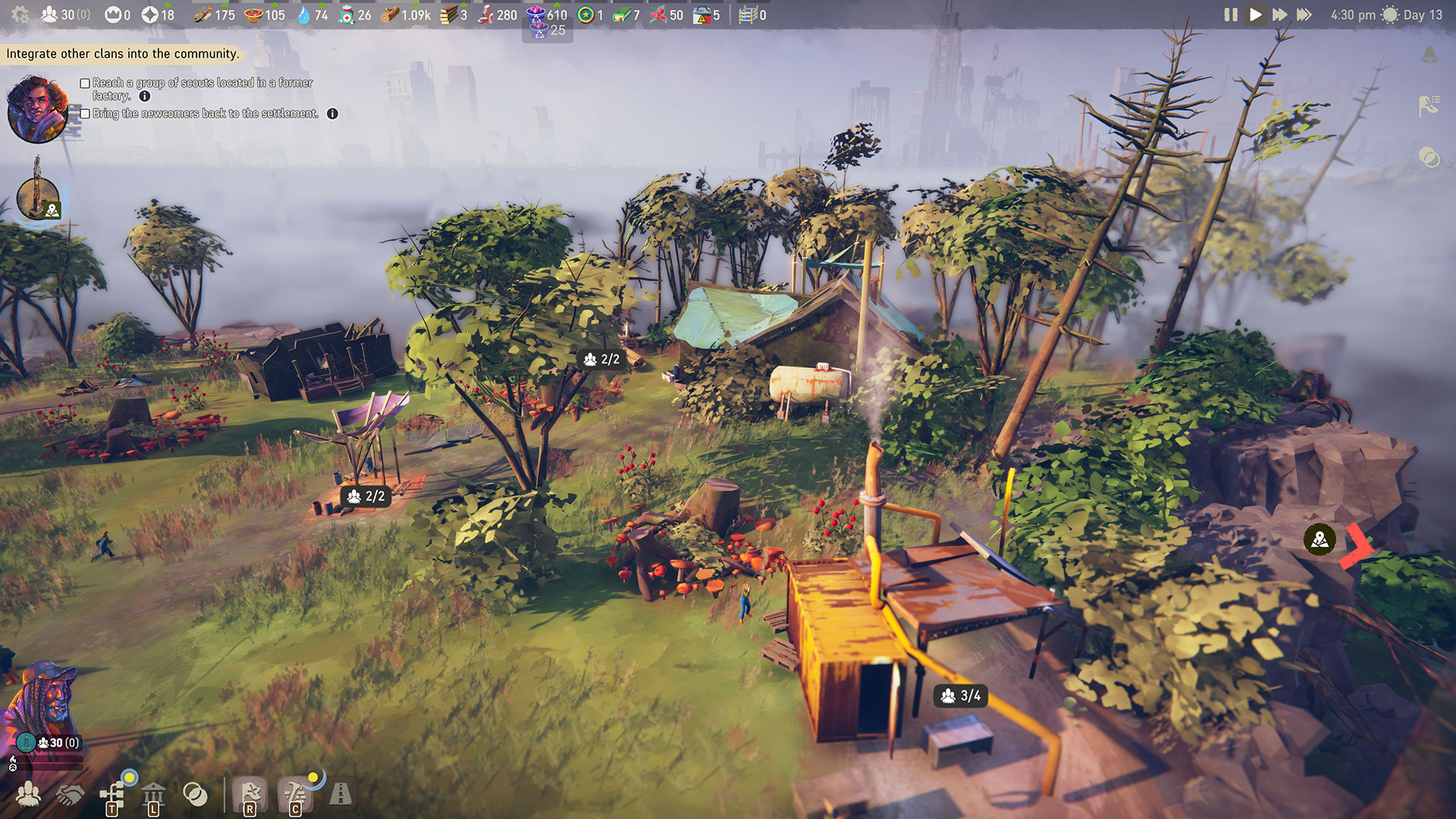
Release date: November 15, 2022
Platform(s): PC
Developer: Vile Monarch
Publisher: Ravenscourt
This city builder is set in a world ravaged by climate change, causing the majority of the population and civilization to be wiped out by floods. What you're left with is a skeleton crew of a colony – with four to choose from as your starting point – and together you'll have to try and rebuild a semblance of a community. You're the leader, and with each clan you add you'll gain a new leader to act as one of your advisors. Unlike some of the other best city builders, this ensures that the people are as important as the buildings you place and the resources you collect. Every decision you make, and later every law you pass, will have an impact on each of the clans, and keeping them all happy isn't always easy. The higher their unhappiness, the higher the unrest, and unfortunately the worse your crime rates get.
The problem is, there's not much to play with when it comes to building your new future. At least initially, you'll only be able to work with what's immediately around you. So, to begin with, rubbish becomes a core building material, berries a food source (later supplemented by fish, shellfish, and bugs), and herbs for medicine. But the minute you find an old radio tower, you'll be able to look for ruins that lie further afield than your initial settlement. From your base, you'll start sending out expedition crews to explore them, and because those opening islands don't have much to offer, this is intrinsic to long-term survival. It's also by doing this that you'll find all important items like Old World Relics that allow you to research and unlock further facilities, technologies, and more.
In hot water
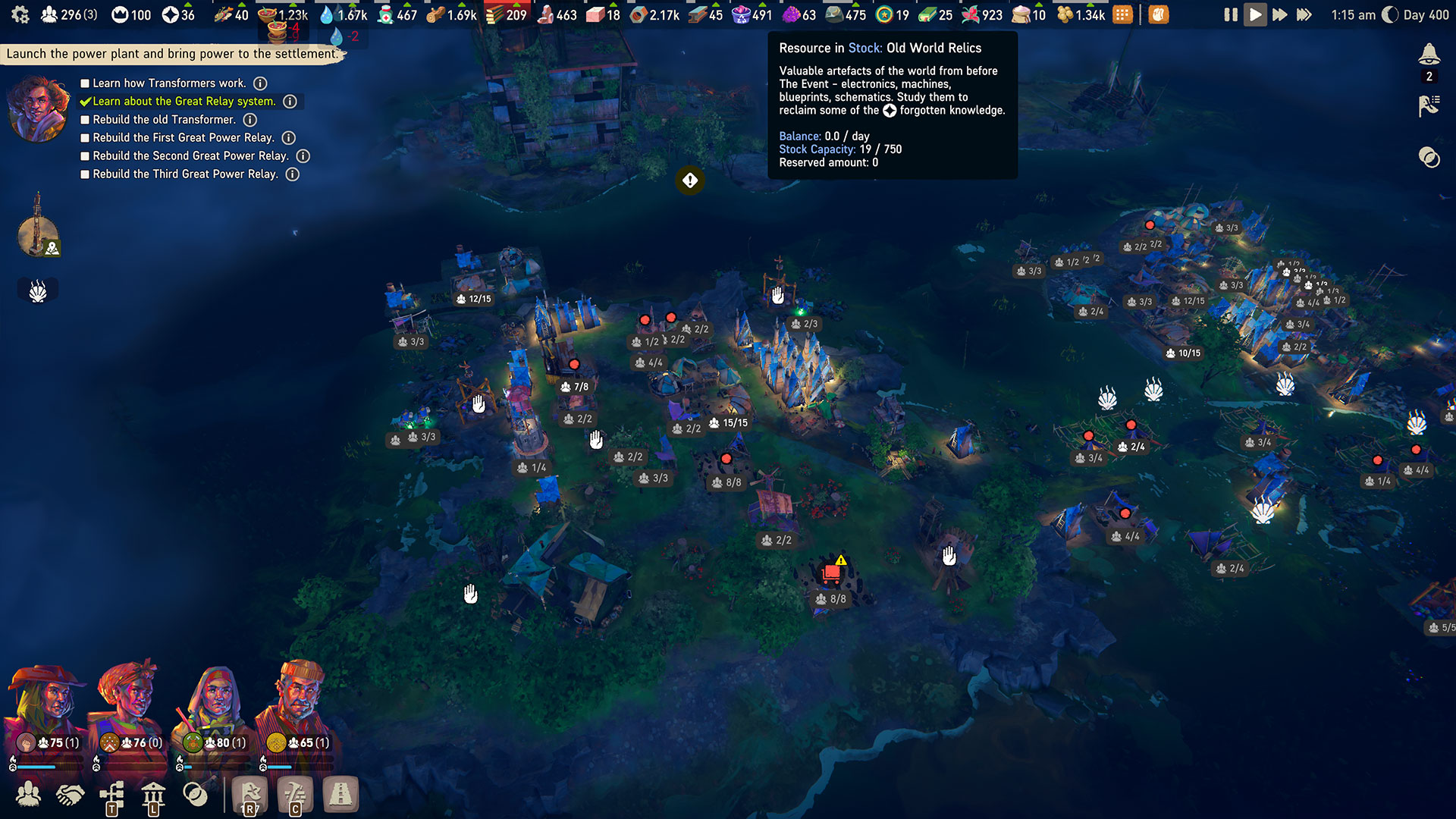
It's sometimes frustrating that so much hinges on gathering these Old World Relics – particularly when it comes to story progression. Expeditions cost you food and water resources, and will take three people away from your core camp at a time. Once you're more established, that's not so much of an issue, but in the early days such a commitment is pretty intensive. Things can go very wrong very quickly in Floodland, especially as clan unrest has its own implications. Ensuring your citizens have enough homes, food, and water are the essentials and without any of those, things can start turning sour. Food is incredibly difficult at first when berries are scarce, and as fish (plus other more involved foodstuffs) can't be eaten raw, so it can take some time to get into a groove.
That's not uncommon with games in this genre, of course, and neither is the fact it can all go downhill rather quickly. What I thought was a quick expedition to a former factory for some supplies ended up with my crew returning with a skin rash that quickly turned into a ferocious epidemic. So many got ill so quickly that food production ground to a halt, which meant people were dying of starvation just as fast as people were dying from the sickness. More deaths meant more unrest, which caused crime rates to spike, and suddenly my settlement had gone from peaceful farmland to a murderous corpse dump.
Water under the bridge
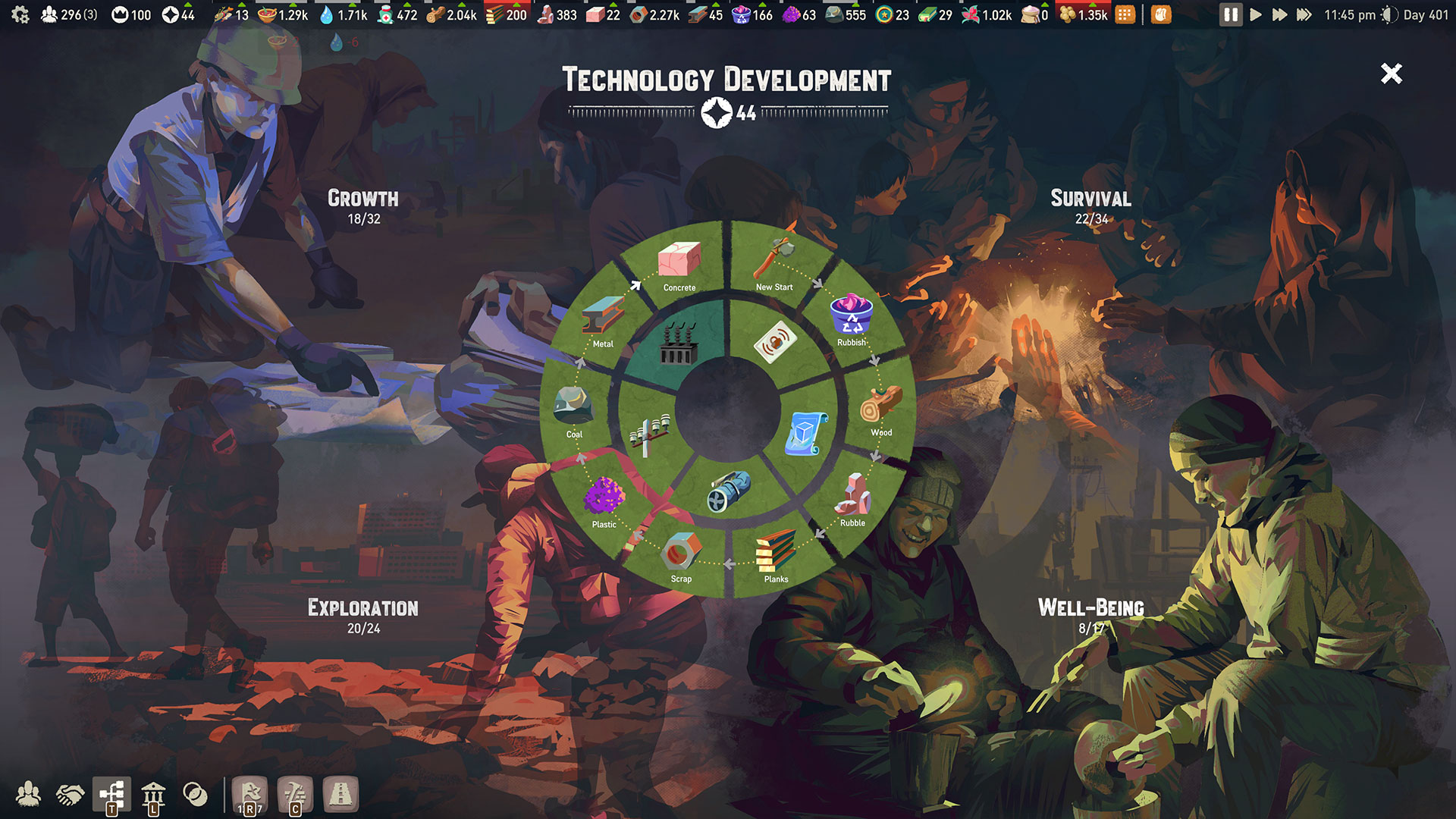
What is rather unique to Floodland though is the fact it's all very straightforward in its presentation. The UI is wonderfully easy to read, there are great tutorials, and it borrows elements from other genres like an upgrade tree to ensure that everything you need to know is within reach at all times. Any issues your settlements have you'll be alerted to immediately, both on your overview screen and on the buildings themselves.
It's just a shame that, even now post-launch, the game has some serious technical bugs that cause some pretty frustrating issues, including your people refusing to eat the food you have in stock, constant moaning about homes not being close enough to their workplaces, and catastrophes like shellfish illness or giant fish invasions occurring too frequently. Plus, I also have an issue where every time the game saves it just stops responding for 30 seconds or so, forcing me to either wait for it to fix itself or my entire game to crash.
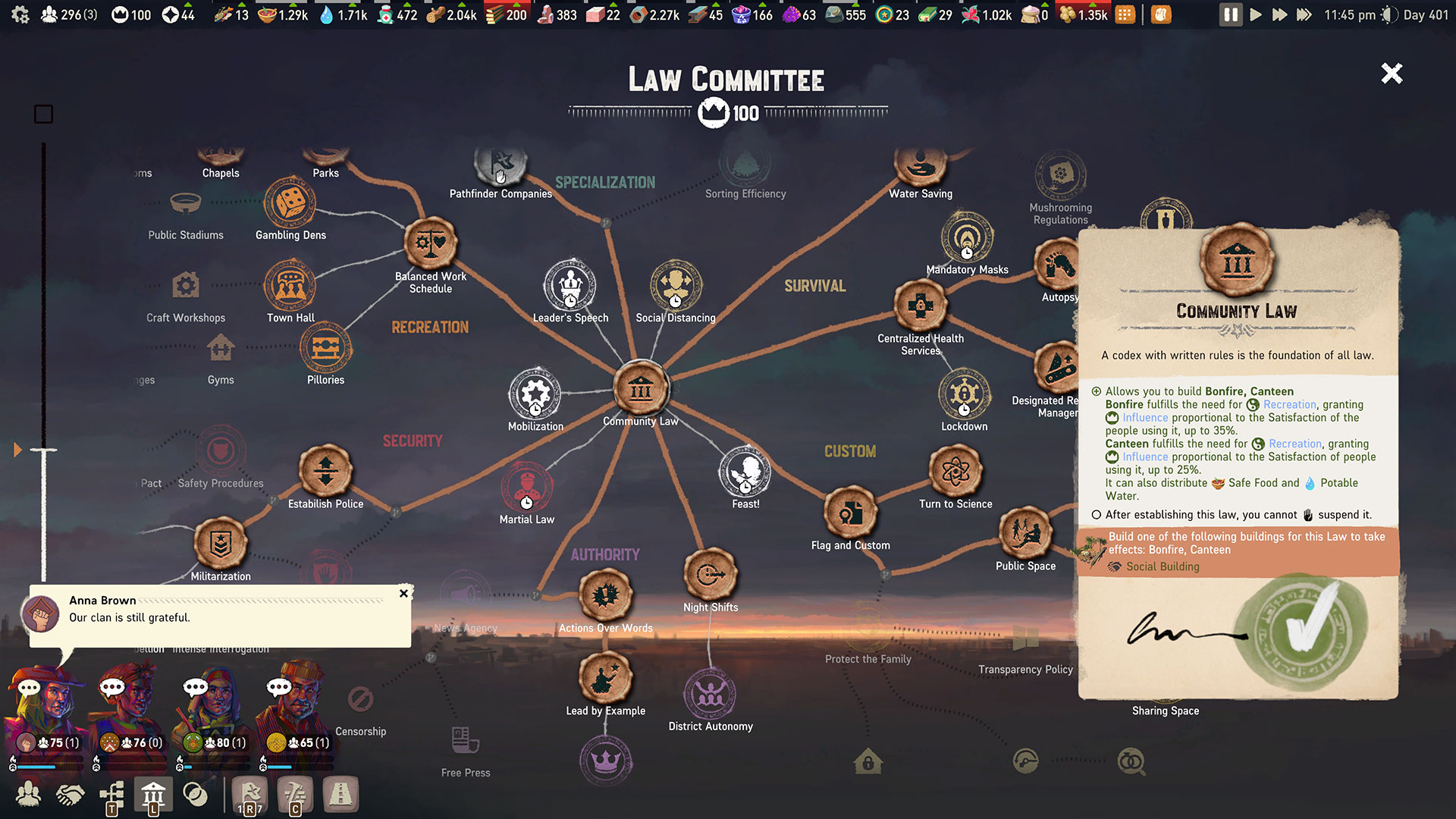
Thankfully, the development team at Vile Monarch says it is aware of these issues and is working on a (clearly delayed) Day One patch. However, it's a testament to the quality of Floodlands' core progression loop that I've still sunk ~30 hours into it – despite the game sometimes acting as if it does not want me to play at all. And that's down to the fact that Floodland is really interesting. The ecology themes and the fact that you have to balance law-making against the needs of each individual clan you invite to be a part of your settlement means you're constantly having to make pretty harsh decisions. Even fairly simple choices like what to do with your dead or whether to pass a law permitting parks to be built can cause chaos. I don't think a city builder has ever made me think as much as Floodland has – it's not easy, but then humans rarely are.
And I think that's what's so impressive about Floodland. It has a message, an intriguing hook, and puts as much emphasis on the actual construction as it does how you deal with the people within it. It's a quiet triumph, and it'll be even more so when those bugs are ironed out.
Reviewed on PC with a code provided by the publisher.
More info
| Genre | Sim |

Sam Loveridge is the Brand Director and former Global Editor-in-Chief of GamesRadar. She joined the team in August 2017. Sam came to GamesRadar after working at TrustedReviews, Digital Spy, and Fandom, following the completion of an MA in Journalism. In her time, she's also had appearances on The Guardian, BBC, and more. Her experience has seen her cover console and PC games, along with gaming hardware, for a decade, and for GamesRadar, she's in charge of the site's overall direction, managing the team, and making sure it's the best it can be. Her gaming passions lie with weird simulation games, big open-world RPGs, and beautifully crafted indies. She plays across all platforms, and specializes in titles like Pokemon, Assassin's Creed, The Sims, and more. Basically, she loves all games that aren't sports or fighting titles! In her spare time, Sam likes to live like Stardew Valley by cooking and baking, growing vegetables, and enjoying life in the countryside.
